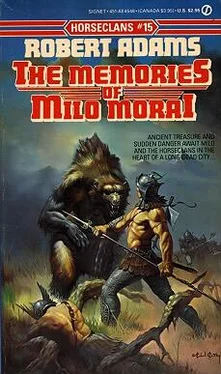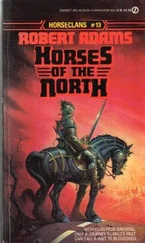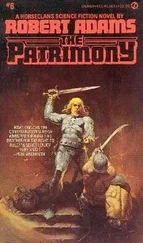“So, yes, let’s start getting the yurts down and loaded up, the teams harnessed and hitched. Two of the warriors ought to be enough to do for the hurt dogs, two more to go about their yurt and cart. Gy and I and the other one will get the hide off that thing.”
Djoolya wrinkled both her brow and her button nose. “Do you think you’ll ever get the reek out of that hide, Milo? And even if you do, finally, will it be worth the effort of scraping and curing and then sewing up all the rents and punctures and tears with sinew? If you’ll observe, that’s a warm-weather pelage, not a thick winter one.”
“We always get the muskiness out of mink and fisher and martin and even wolverine, don’t we, Djoolya?” he replied. “Does that skunk-skin cap of yours now smell at all like the former owners?
“You’re right, of course, about the light fur, but if this beast is as rare a one as it seems to be, it should have value as a novelty, if nothing else, and we might get something of more worth in trade for it, some-where along the line.
“Oh, by the way, that two-handled gray-steel box from the ruin—where is it now?”
As he squatted at the tail of a canted cart, feeding the fat, stubby, ancient but still shiny .45 caliber cartridges into three of the silvery stainless-steel magazines, Milo felt a brief stab of longing for that world now long centuries in the dead past, that world of which these deadly artifacts were only pitiful reminders.
After he had threaded the webbing magazine pouch onto the pistol belt and hooked the leather holster in place, he cinched it about his waist, inserted a loaded magazine into the butt of the weapon and slipped it into the holster. Even with the holster flap secured, however, he still was worried about the possibility of the irreplaceable pistol falling out, so he snapped the lanyard to the butt ring.
He now half-wished that he had left the way clear to obtain one of those powerful rifles that had been stored with the pistol. That would have put paid to such a big, dangerous animal quickly enough, and from a far safer distance than this pistol, the primary utility of which was and had always been mankilling at very close quarters.
When he at last got around to pulling off the pierced, torn boot, there was, aside from torn, blood-stiff trouser leg and sock, no mark to show of his injuries inflicted by the creature’s sharp teeth and strong jaws and fury, but then he would have been shocked if there had been such. With a deep sigh of annoyance, he sought out his clothing chest and another pair of boots.
Sacred Sun was well up in the sky by the time the party got on the move, so they set a brisk pace, taking only such game as they came across directly in their chosen path, not taking time to actively hunt for prey. Snowbelly ranged out ahead alone, while the other two cats alternately ran the flanks of the column and trailed the horseherd, seeking out any trace of the musky stink that identified the peculiar beasts like the one whose pelt—now scraped and soaked and salted and rolled up—rode along lashed to the tailgate of a cart, dripping water and serum and covered with dust and a metallic-hued carpet of feeding flies.
Pushing onward an hour or more after the usual halting time unexpectedly brought them to the fringes of the ruined city, and, after finding a lake a mile or so north, Milo and the party set about making camp near the lakeshore among the scorched, tumbled, much-overgrown shells of the homes that had apparently composed part of a small subdevelopment, long ago, in another time, in a vanished world.
Milo still was unsure of their exact location. However, he felt they were too far north for the ruined city to be Tulsa ; they might be somewhere in western Missouri, but he suspected, rather, southeastern Kansas. With any kind of luck, there should be some-thing left still legible in those ruins to tell him precisely.
He breathed a silent sigh of relief when, after a wide-swinging circuit of the lake area, the cats reported no trace of the scent of the ilk of the giant mustelid, though there seemed to be a plentitude of game and a few of the more normal predators about.
“No lions or big bears, I hope?” queried Milo.
“Not that I sniffed out,” replied Snowbelly, adding, “There is a sow bear and her two half-grown cubs denning in a place just east of the camp, but she is not one of the big, flat-faced bears, only one of the smaller, the ones you call black. The only cats about seem to be the short-tailed ones.”
“There is at least one bigger cat,” Crooktail put in.
“Puma?” Milo asked.
“No, bigger,” she replied. “Notso big as me or even as Spotted One, though.”
“Maybe just a very big puma, then, cat sister?” beamed Gy Linsee. “They can get big. When my sire was a boy, guarding sheep of a night, he speared and killed a puma that weighed a hundred and fifty pounds.”
“No, Brother Gy,” Crooktail beamed back. “This cat smells in no way like a puma or like Spotted One, either, although she is just a little smaller than Spotted One and, also like Spotted One, will soon throw cubs.”
Milo nodded. “All right, we’ll camp in this place tonight only. Tomorrow we’ll move farther northeast and put the widest part of the lake between the camp and herd and those ruins.
“Snowbelly, no more than one of you cats is to night-hunt at a time; I want at least two guarding the herd, constantly. With really plentiful game here-abouts, of course, the predators may not exhibit any slightest interest in trying to take a horse at all, but those who take enough chances usually suffer for it in the end.
“Herbuht, you and Djim-Bahb Gahdfree take the hunt in the morning, eh? I’ll be taking; Gy and Little Djahn over into the main ruins to see what we can see.”
It was unnecessary for him to add that they would harvest any edible animals they chanced across—that was simply the Horseclans way.
Like the isolated ruin they had found back west on the prairie, most of the small city was tumbled and thickly overgrown and, under the vegetation, there seemed to be frequent indications of old conflagrations. The three horsemen rode slowly along what once had been metaled roadways, but now the macadam or concrete only showed through in the rare spot here and there beneath the soil that held the roots of grasses, weeds, shrubs and trees.
Milo led a curcuitous way toward the visible, multistory ruins that he thought to be the center of the dead city. He did this in part because, uneven as was the surface of the streets, occasionally rent or bisected by subsidences of varying widths and depths where subsurface piping had collapsed, still did those streets offer more reliable footing for the horses than might have been obtained by threading a way between the overgrown ruins of homes and smaller buildings that lined them. Another reason for avoiding the tangles of brush and vines was his desire to, if possible, avoid for now the beasts likeliest to be denning within the roofless, sagging walls or the tumbled piles of masonry; he and most of his clans only killed predators when the folk or their stock were threatened by the beasts or when the pelts were needed for clothing, bedding or trade—and this was no season for good pelts to be had.
As they entered upon a street forking off one along which they had been riding, the cawing of carrion crows caused them to look up into a huge-boled, ancient oak. There, some thirty feet up the tree, wedged into a crotch, was the partially eaten carcass of a white-tailed deer. All the hide and flesh were gone from the head and neck, shoulders and forelegs; moreover, the doe had been partially gutted.
“Now how in the hell did that deer get up there, I wonder?” remarked little Djahn Staiklee.
Recalling Africa, Milo said, “She was put up there to keep her out of reach of other meat-eaters until the killer comes back to feed again on her. That little trick answers the question of just what kind of large cat it was that the prairiecats smelled out in these ruins. The only cat of any size that does that is the leopard.”
Читать дальше












